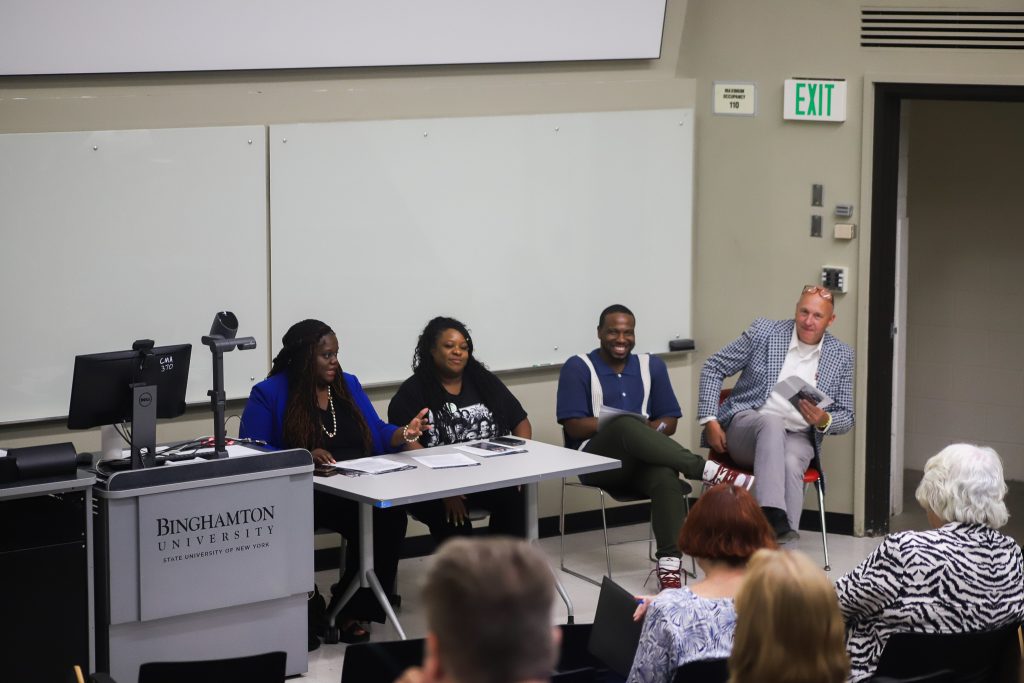A panel discussion joined by New York State Sen. Lea Webb to discuss housing and food insecurity in upstate New York was held this past Thursday at Binghamton University.
Organized by the policy group Economic Security Project Action and nonprofit Empire State Voices, the forum ran from 5 p.m. to 7 p.m. in the Lecture Hall. Panelists included Webb; Les Aylesworth, director of the Community Hunger Outreach Warehouse for the Broome County Council of Churches; Salka Valerio, a community organizer with Citizen Action of New York, an activist group; and Jay Brandon, Empire State Voices’ organizing director.
Zachary Tirgan, Empire State Voices’ regional organizing director for the 19th Congressional District, described why they chose BU as a venue for the discussion.
“While students are one of the most active demographics in advocacy around social issues, issues like food and housing insecurity often receive much less focus,” Tirgan wrote in an email. “We chose to host this forum at Binghamton University in an effort to bring young people into the conversation about the economic issues being felt acutely right here in Binghamton. As a SUNY, students from all walks of life and with diverse backgrounds and views attend. We want to make sure their voices and ideas are brought into this conversation.”
The panel consisted of two segments — a discussion among panelists and a Q&A session. The first part began with a conversation about the key pillars of a functioning social safety net — programs that support people through economic instability — and the core issues these programs should address.
“I would say one of the biggest pillars that I think should be part of any safety net is dignity and respect,” Webb said. “When you talk about the challenges around the issues we’re talking about tonight — housing, food insecurity — a lot of the stigma that gets associated with individuals who are reliant upon these services, there’s a lot of narratives that people didn’t work hard enough. That if they just worked harder they wouldn’t be in the circumstances that they are in or they’re taking advantage of certain types of service, and I think for any safety net, it has to be centered around dignity, respect and treating people as human beings. Because these issues that we’re talking about tonight are fundamental needs we have, regardless of your income status.”
As the discussion continued, Webb emphasized the importance of tackling these larger problems to better help constituents with the symptoms of these issues in their daily lives. She said that in the State Senate, she and her colleagues try to find root causes of social breakdowns and undo past harm.
“Is it that we have a law in place and it just needs to be updated because as humans, our experiences change, it’s dynamic, it’s fluid,” Webb said. “So maybe the experience or issues that we had 20 years ago are slightly different now? So policies are supposed to be fluid in that way to change the laws to reflect the needs. And at the same time, that also requires us to think about and be more intentional on where we are making financial investments.”
Webb listed several resources available to those facing food and housing insecurity, including Nourish New York, a program spearheaded by the state government to help food-insecure people by reallocating surplus agricultural products through the food bank network. The state also increased funding in education for school lunch programs and investments in agriculture, small businesses and affordable housing.
The Empire State Voices campaign is developing a panel on tax fairness, to be hosted next month, which will take a look at the 2017 Tax Cuts and Jobs Act, which was passed by Republican majorities in Congress. Tirgan said he hopes the panels will lead to larger, more empathetic conversations centered around providing food and housing to New York families.
“I sincerely hope that conversations like the one we had on Thursday will help to build a dialogue around government aid programs that centers empathy, first and foremost,” Tirgan wrote. “We need to remove the stigma that’s often placed on recipients of government assistance and focus instead on shoring up the weaknesses in these programs. Rather than talking about how we can cut programs in favor of corporate tax breaks, we should be working to ensure that every family in New York is able to put food on the table and keep a roof over their heads. It’s really that simple.”



